Co-operatives UK’s annual congress brought delegates from around the country to Birmingham on 17-18 June to explore ways to ‘empower co-operation’.
It was the first in-person congress for Co-operatives UK CEO Rose Marley, who used the opportunity to bring together different parts of the movement, as well as people from sectors where co-ops have the potential to make a difference.
Alongside co-operative leaders and practitioners, delegates heard from those in the music and healthcare industries, metro mayors and MPs, who engaged in conversations about how people, businesses, employees and activists can work together to solve problems and make lives better.
Challenging times and a co-op future
Welcoming delegates, Co-operatives UK chair Don Morris talked about the current challenges, from Covid-19 and the war in Ukraine to the cost of living crisis. “This conference is about action,” he said. “Take learnings back to your co-ops and drive change.”
The event was sponsored by the Co-op Bank, and its director for consumer and people, Maria Cearns, told delegates about the organisation’s co-operative heritage, arguing that co-op values are still at the heart of its ethical policy.
The bank will continue to support co-op businesses, she added – through its products and services as well as its funding of the Hive, Co-operatives UK’s co-op development programme.
There is also political support. In a video message, West Midlands mayor Andy Street said his region will be looking to create more jobs using the social economy and co-ops as it rebuilds from the pandemic.
But Ms Marley warned that while there is a lot happening in the co-operative movement, it still lacks visibility. She referred to a YouGov poll commissioned by Co-operatives UK which found that, while issues causing concerns for young people could be addressed via co-ops, less than 40% of young people surveyed could name a co-op. “There’s something not connecting there and we need to fix that,” she said.
Related: Congress session on development in the devolved UK nations
From the UK’s most visible co-op, the Co-op Group, came a video message from interim CEO Shirine Khoury-Haq, describing how her organisation aims to empower co-operation.
She said: “Funds can only go so far in empowering co-operation and cash on its own cannot empower co-operation”.
Co-operation is also empowered by building strong relationships between co-ops and their members, she said, and told delegates it was important to recognise that “the best form of co-operation might not always include the Co-op Group and its members.”
Members had been involved with Group 1.7 million times in 2021, she said; the society wants to build on this through community support, fundraising, and raising awareness.
“Galvanised members make us a better co-op which, in turn, makes us a better partner,” she added, arguing that co-operation is about creating relationships that sustain themselves, and improve the lives of communities.
“We shouldn’t be seeking groups to create dependencies on the Co-op Group,” she said.
The Group also sent non-executive director Lord Victor Adebowale, who had stern words about the state of UK co-ops, which he sees as an interest group, rather than a movement.
“You’re too white, you’re too old, you’re too embedded in the rules,” he warned, arguing that co-op principles are “open to interpretation”.
He thinks they could be summarised in two principles – “Be human, be fair” – and should be expressed “for people who live now and are going to be running the movement in 10 years”.
“We need to find ways of expressing what a co-op is for young people,” he said. “There is a communication gap between us and them.”
“We need to stop talking to ourselves so much and start talking to people who are not members,” added Lord Adebowale. He urged co-ops to spend time asking people what is wrong and translate that into applicable principles.
“We’ve got to do better,” he said. “You’ve got to look different. You’ve got to speak differently. We’ve got to invite people in. You’ve got to figure out some improvements. That’s how we make change.”
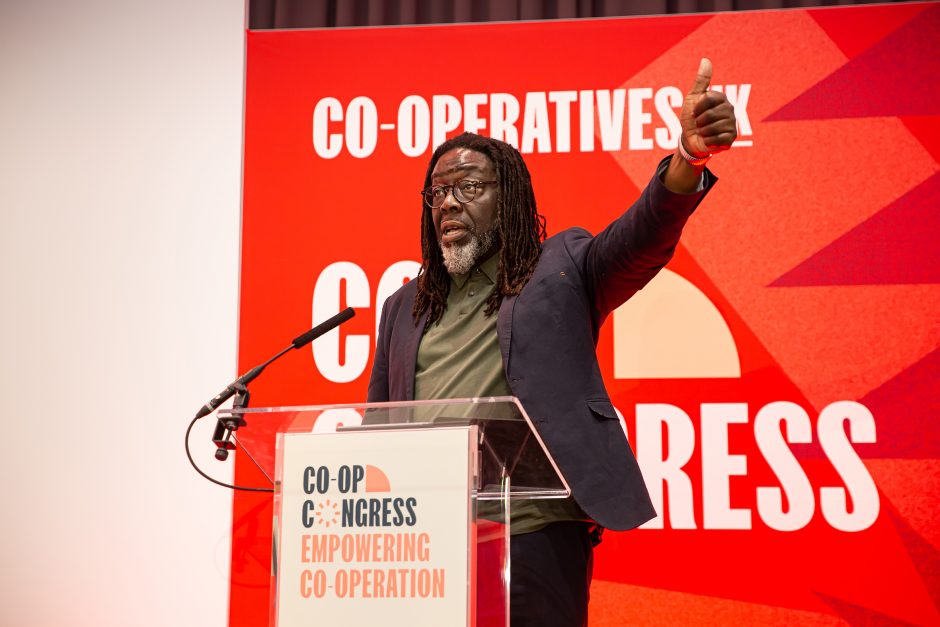
Empowering co-operation
Over the two days, delegates could join a plethora of sessions covering issues and ideas concerning co-operatives today, including how to make membership meaningful; the state of co-operative development across the nations and regions of the UK; the use of the Co-operative Marque and plans in the UK to more closely link the Marque to high co-operative standards; empowering young people to explore and live co-operative values; and discussions around the creation of a new federal body for worker co-ops.
Technology
One of the most popular sessions looked at how technology could enable a stronger co-operative economy.
Catherine Douglas, managing director of SMEs at the Co-operative Bank, shared her experience working with Bankify on opening a new app for their SME customers. Prior to this project, the Co-op Bank recognised that its digital service was not up to scratch. The experience meant it had to “innovate quicker than we are used to.”
Central England CEO Debbie Robinson shared her “co-op digital dream” of being able to log into an app in any country and find local co-op businesses. She suggested that a crypto currency for co-ops could be a way to overcome traditional economic barriers.
There were also discussions around the ethical use of data, with Emma Howard, technical partner at Open Data Services, warning of the ethical issues regarding the personal data that people freely give away when they use the internet.
These issues include serious concerns over human rights, democracy, governance, and data ethics. She believes we need a new model that allows co-ops to use data in a way that benefits them as well as their members. “Data is one of the most important commodities in the current climate,” she added.
DotCoop’s Violetta Nafpaktiti agreed: “Why don’t we create a new worldwide co-op data-sharing project?” she asked.
Access to capital – the perennial question for co-ops of all stripes – was also highlighted in the session. Co-ops can compete with the ability of conventional tech companies to access venture capital – in a sector that often needs substantial amounts of money to drive development.
Music
The music industry is one sector increasingly turning to co-operatives for models of fairness for performers and punters.
Music contributes £5.8bn to the UK economy, including £2.9bn in exports, said Sarah Pearson, founder of Wasted Youth Music. But the music industry serves those at the top at the expense of the majority of musicians, where “exploitation is the name of the game”.
Tom Gray, singer from 90s indie band Gomez who founded the #BrokenRecord campaign in response to artist complaints over streaming rates and record company contracts, said “the model had changed but the relationship with musicians had not.” Music is dominated by large labels with executives making millions while most musicians struggle, he said.
Paul Pacifico referred to the Fair Digital Deals Declaration, which is often attached to record deals and gives a level of protection to artists, but chartered accountant and streaming royalties expert Colin Young spoke about how there was equity in songwriting but not in the record industry. “We need legislative change,” he said.
Terry Tyldesley, music tech consultant and artist, said there are lots of new ways for musicians to release music, highlighting Resonate as the co-op alternative to the existing streaming platforms.
Lord Adebowale, speaking in his role as chair of the Urban Development Music Foundation, likened the music industry to “a pint of Guinness: lots of black talent with white executives creaming off the money”. Young people become musicians, he said, but they are not prepared to become a small business and are exploited as a result.
The speakers acknowledged that change is needed, but there were disagreements about the rate of progress – although all agreed that co-op interventions like Resonate can help for the future. At the end of the session, Geraint Davies MP took to the stage and announced that he will be bringing forward a co-operative music bill to Parliament.
There was also a session from Mark Davyd, CEO and founder of the Music Venue Trust, who spoke of the uncertain future facing independent music venues in the UK, the majority of which have an average of 18 months left on their tenancy.
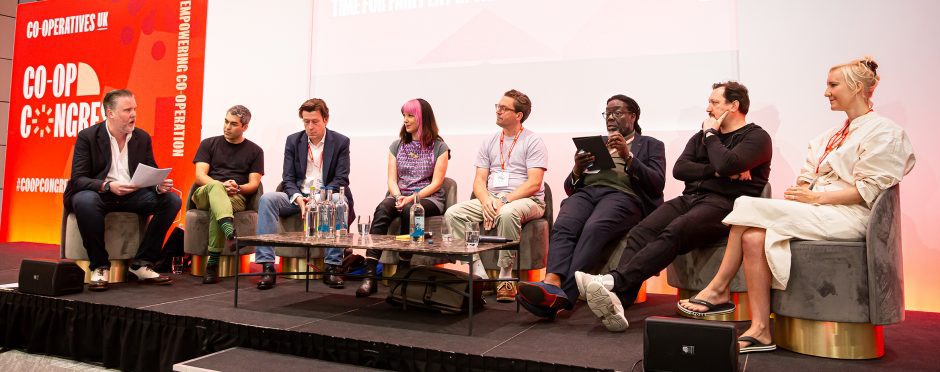
“Everyone loves music,” he said, “but it’s a precarious existence for many grassroots music venues. They’re at the mercy of landlords who can hike prices or fail to renew contracts.”
The music industry needs those venues, he added. “Playing them is how bands learn their craft and progress from rooms in pubs to stadium gigs. Think of some of the great bands whose music you love. If local venues like these didn’t exist, you may never have had the chance to hear it.”
In May, MVT launched an ambitious campaign for the live music community to own, protect and improve grassroots venues across the UK.
The climate crisis
There were also sessions exploring how co-ops can engage with climate action.
One session focused on the Climate and Ecology Bill, which aims to ensure the UK government fulfils its Paris Agreement obligations to limit global temperatures to 1.5°C; conserves the natural world by protecting and restoring ecosystems; and establishes a citizens’ assembly to recommend measures for inclusion in a climate-nature strategy.
So far the private members bill has support from 152 MPs and peers as well as 200 councils. Speakers shared how co-ops can – and are – add their weight to this support.
“This blue dot is all we have,” said the BBC’s George McGavin, adding that from the 1970s we have known the damage we are doing to the planet, from habitat loss to pollution and invasive species spreading. “The planet will be fine, it is our survival that it is at stake,” he warned.
Amy McDonnell, from youth climate campaign Zero Hour, said her organisation was using tactics of mass mobilisation.
Co-operatives and other ethical businesses have been are the front of climate actions for decades, said Deborah Darlington, of the Co-op Bank – which stopped investing in fossil fuels in 1998. The Bank is now on the sixth version of its ethical policy, which is “highly valued” by its customer base. Ms Darlington said the bank is urging customers to support the bill.
Barry Clavin, senior ethics & sustainability manager at the Co-op Group, said the retailer is mobilised people for the Climate Change Act – but added that young people are not getting involved in the climate movement in enough numbers.
In a separate session, delegates heard about some of the practical ways co-ops are taking climate action. Jonathan Atkinson, co-founder of the Carbon Co-op, described how the organisation deals in energy efficiency, electric vehicles, heat pumps and other innovations. This delivers for consumers as well as the environment: external wall insulation from the Carbon Co-op can save a £1,000 a year on energy bills, he said.
Midcounties’ head of sustainability, Mike Pickering, represents his co-op on an sustainability forum that shares best practice in the industry. There is a big mixture in how far businesses are on this journey, he said, and the forum helps them move forward.
Michaela Cryar, head of product and origination at Younity –a community energy initiative between Midcounties’ Co-op Energy and Octopus Energy – talked about the importance of technological innovation, and gave the example of a partnership between the Energy Garden, Patagonia, Octopus and Powershare, which encourages youth involvement in community energy.
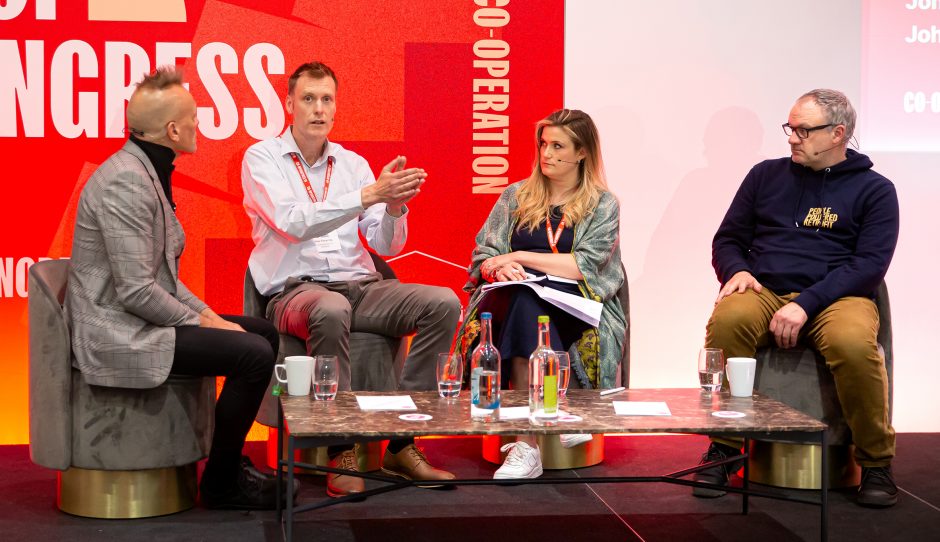
The capital conundrum
A recurring theme over the weekend was the difficulty co-ops have in accessing capital to set up or grow.
In a session on community shares, delegates heard how £200m has been raised using community shares to support, save and set up hundreds of vital businesses – with an impressive 92% still trading.
Eva Goudouneix, community development manager at Repowering London, said her co-op has put solar panels on community buildings. It ran two community share offers – in its home borough of Lambeth, and in Kensington and Chelsea. The first raised £140,000, the second £80,000, and there was booster funding from the Community Shares Booster programme. Ms Goudouneix noted how 90% of the money for Lambeth came from the local community, compared to only 30% for Kensington and Chelsea.
David Boyle, from the Community Shares Company, explored the demographics the typical community shares investor. Unsurprisingly, 60% of the money comes from 10% of investors – who are retired and have a bachelors degree. “How many Guardian readers are in your target area?” he asked.
A few key conditions can bring success or failure for a community share offer, he said. These include a sense of identification with what is being offered; a committed core team; and the time to do everything that is needed.
In a separate session, Tony Greenham of the Mutual Banks Association (MBA) and Cliff Mills, of Anthony Collins Solicitors, presented their efforts to tackle the capital conundrum in the finance sector – where capital is highly regulated. To address barriers to co-operation in this sector, the MBA has developed a new co-operative structure under the Companies Act 2006 that does three things: legally embed a common good corporate purpose; create a multi-stakeholder ownership structure with active participatory governance; and create a form of co-operative equity capital that can deliver fair returns to early-stage, high-risk investors – while, crucially, remaining aligned with co-operative principles.
“We’ve created an association under the Companies Act which is designed to be more flexible around capital, to solve some of the problems while being mutual,” said Mr Greenham. “My aspiration is that it would be recognised by the co-operative movement as also being properly co-operative.”
Healthcare
The Co-operative Councils Innovation Network (CCIN) hosted a session looking at how co-operatives can make a difference in care, applying the co-op principles to create new and effective ways of working and become part of a solution to the care crisis. Dr Justin Varney, director of public health at Birmingham City Council, described how the city is working in partnership with Lewisham Council Public Health Divisions to gather insights on health inequalities within black African and Caribbean communities.
He described how Covid-19 “created, for the first time for some generations, that feeling of universal experience that made people feel united with other people and made them want to do something about it – for the first time ever in my years in health, people were checking their privilege without being prompted.”
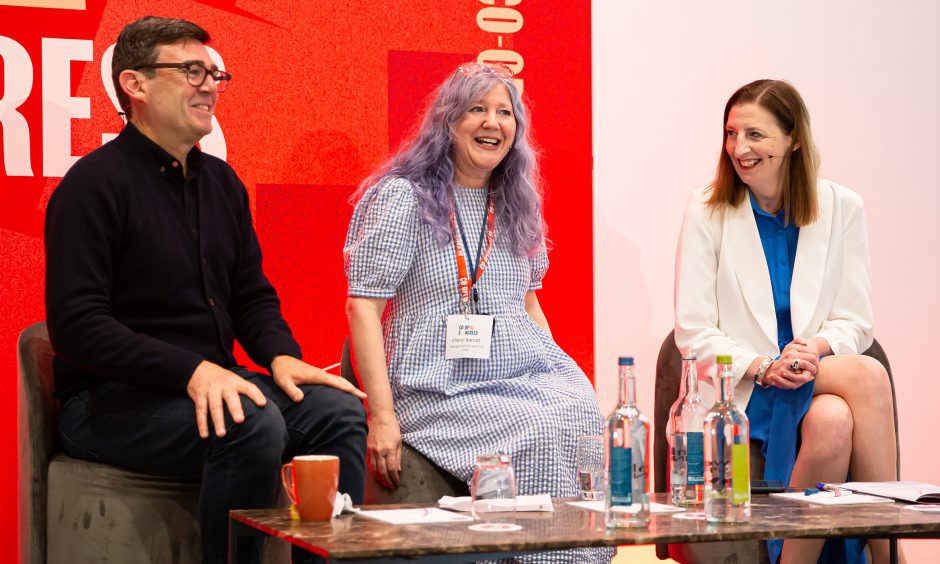
Cheryl Barrott of Change AGEnts and a Co-operatives UK board member, said that, as a disabled person, she didn’t want to be “done to or done for, I want to be done with”, adding that the co-operative model gave recipients of care vital control over their own lives.
In another session highlighting issues in the care industry, Andy Burnham, mayor of Greater Manchester, highlighted the problems of associating ‘care’ with ‘profit’.
“I still believe care in this country needs radical change,” he said. “Social care should be provided on NHS terms but we haven’t got that at the moment.
“The profit motive does not sit well with care of any kind – that’s the problem. The more complex the needs, the more that profit motivation becomes a problem. This is a broken system.”
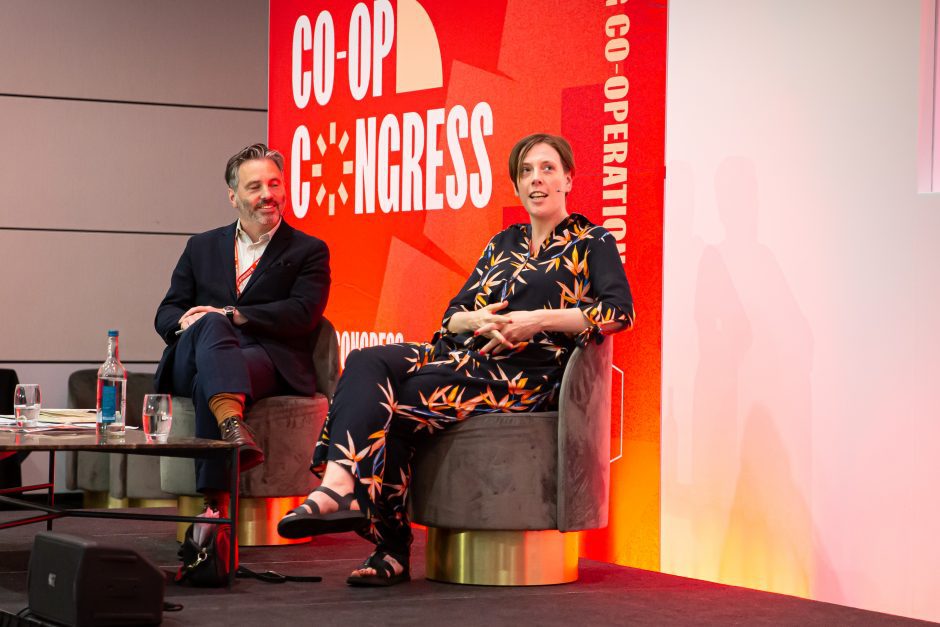
Another politician at the event was Labour MP Jess Philips, who held conversations with co-operators in the care, energy and student housing sectors. “There is a fissure in understanding when it comes to people investing in things together – it sounds like socialism,” she said.
“There’s a belief deficit with current government – what needs to be done to prove this is for it to become a more populous issue and for people to say ‘this is what we want’.”
Co-ops “have to be a solution to a problem that people are clamouring for,” she added. “Then people like me can argue for it.”